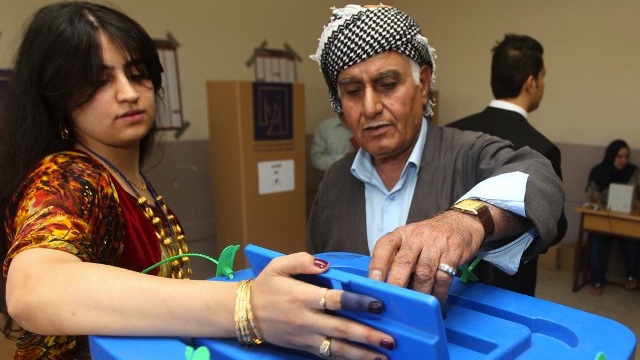SUMMARY
This is AI generated summarization, which may have errors. For context, always refer to the full article.

ARBIL, Iraq – Iraq’s Kurds voted Saturday, September 21, in their first election in four years as their autonomous region grapples with disputes with Baghdad while fellow Kurds fight bloody battles in neighboring Syria.
The election for the region’s parliament comes as the turmoil roiling the Middle East has raised renewed questions about the political future of the Kurdish nation as a whole.
The Kurds are spread across a number of neighboring states, where they have long faced hostile governments but have found increasing space to pursue their aspirations to run their own affairs.
About 2.8 million Kurds are eligible to vote across the three-province region of northern Iraq, and queues were already forming when polls opened at 7 am (0400 GMT).
Some voters wore traditional garb that is is often reserved for special occasions, while many women wore full-length black abaya robes.
“The situation used to be so bad, under the former Baathist regime,” said Ghazi Ahmed, referring to the rule of now-executed dictator Saddam Hussein, who brutally persecuted the Kurds while in power.
“But now life is better, we are in a good situation,” the 56-year-old shopkeeper said. “Life now is good, and hopefully the situation will improve in the future.”
Polls close at 5 pm (1400 GMT), with preliminary results due in the coming days.
The campaign centered on calls for more to be done to fight corruption and improve the delivery of basic services, as well as on how the energy-rich region’s oil revenues should be spent.
Regional impact
The election, the first since July 2009, sees three main parties jostling for position in the 111-seat Kurdish parliament, with implications beyond Iraq.
The Kurdistan Democratic Party (KDP) of regional president Massud Barzani is widely expected to win the largest number of seats, although it is unlikely to obtain a majority on its own.
“Today is a historic day in the history of the Kurdish people,” said regional prime minister Nechirvan Barzani, the president’s nephew.
“We have taken another step in the region to consolidate democracy.”
The Patriotic Union of Kurdistan (PUK), which is in government with the KDP, however faces a challenge from the Goran movement in its Sulaimaniyah province stronghold.
The challenge has been heightened by leadership questions as the party’s veteran leader, Iraqi President Jalal Talabani, recuperates in Germany from a stroke.
Internationally, the focus is likely to be on the region’s drive for greater economic independence from the federal government, with which it is locked in multiple disputes.
The region has sought to establish a pipeline that would give it access to international energy markets, has sent crude across the border to neighboring Turkey, and signed deals with foreign energy firms, including giants such as Exxon Mobil and Total.
It has also capitalized on its reputation for greater safety and stability, as well as a faster-growing economy than the rest of Iraq, to solicit investment independent of the federal government.
All this has drawn the ire of Baghdad, and the two sides are also locked in a protracted dispute over the Kurds’ longstanding demands for the incorporation of other traditionally Kurdish-majority areas into their autonomous region.
Syria spillover
The region has also become increasingly embroiled in the 30-month-old conflict in neighboring Syria.
Clashes last month between Kurdish forces and jihadists seeking to secure a land corridor connecting them to Iraq pushed tens of thousands of Syrian Kurds across the border, seeking refuge in Iraq’s Kurdish region.
Barzani has threatened to intervene in the Syrian conflict to protect Kurdish civilians, although officials have since backtracked on those remarks.
Syria’s Kurds have taken advantage of the uprising against President Bashar al-Assad’s rule to set up their own administrations in a number of Kurdish-majority areas.
Iraqi Kurdistan enjoys a high level of autonomy from Baghdad, and the regional parliament has passed laws on a wide range of issues.
Kurdistan also operates its own security forces and visa regime and has control over an array of other responsibilities.
The Kurdish authorities boast that the region enjoys greater freedom than the rest of Iraq, but their human rights record has still come in for criticism.
Ahead of the polls, attacks on Goran supporters left one person dead and several wounded. – Rappler.com
Add a comment
How does this make you feel?





There are no comments yet. Add your comment to start the conversation.